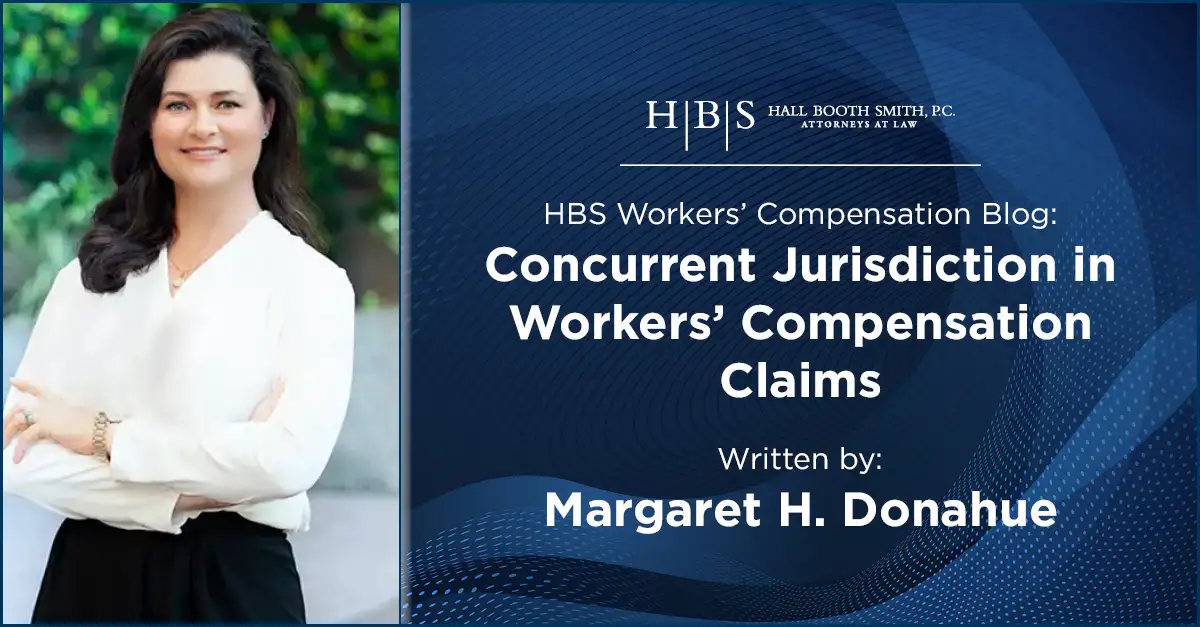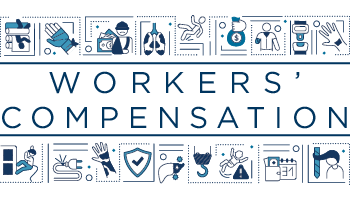
Concurrent Jurisdiction in Workers’ Compensation Claims
Introduction
Workers’ compensation is, at its core, one of the more state-specific areas of the law. Each state legislates its own statutes and regulations and operates its own administrative body, often very differently.
However, concurrent jurisdiction (also called joint or dual jurisdiction) is an issue we see with relative frequency in workers’ compensation claims. The opportunity for a claimant to file his or her claim in more than one potential state can significantly alter both procedural matters as well as potential exposure.
Jurisdictional Issues
Hall Booth Smith’s Workers’ Compensation team handles claims across the Southeast and represents employers with national footprints. We are seeing an increase in cases where proper, or even possible, jurisdiction is at issue.
Most states are consistent in two areas which will avail a claim to jurisdiction in the given state:
- Location of the accident.
- Location of the employee’s principal place of employment (defined not as the corporate headquarters, but the location to which the claimant reports).
Other popular triggers to jurisdiction are either the place of the employer’s principal place of business or the, often-litigated and highly fact-driven, place where the contract for employment was made.
Requests for Change of Jurisdiction
In most cases where concurrent jurisdiction arises, we see the employer filing the initial report of injury and initiating the claim in the state according to the employer’s place of business. This is one correct option for jurisdiction, and jurisdiction won’t typically be contested or changed when the claimant’s residence is in the same state as the employer.
We most often see requests for change of jurisdiction when the employer is located in a state other than where the accident occurred, and the state of accident is where the claimant lives and/or has preferential benefits.
Example: Location of Accident
Employer is located in Augusta, Georgia, but the job duties require Claimant to travel into bordering areas of South Carolina, where an accident ultimately occurs. Employer files the FROI in Georgia because it is located in Georgia and that is the base of operations. Claimant requests jurisdiction be changed to South Carolina. South Carolina will accept the claim as jurisdiction is proper based on location of the accident.
Claimant may do this because he lives in South Carolina and sees it as a convenience to have the claim or treatment in South Carolina (we see this all the time in areas along state lines), or Claimant may have sought advice of counsel and learned that South Carolina has higher weekly compensation rates and permanency formulas.
Example: Principal Place of Employment / Place of Contract for Employment
Employer is a commercial construction contractor with corporate headquarters in Tennessee but projects across the country. Claimant is a resident of South Carolina but was hired with respect to and is reporting to a project in Florida where he is injured. Claimant’s principal place of employment would be Florida, and Florida would have jurisdiction.
However, there may be an argument that the contract for employment was made in South Carolina if the employer knew Claimant was a South Carolina resident and that the offer employment was sent to Claimant in South Carolina. If Claimant is able to work modified duty through treatment, it may be most convenient for him to keep jurisdiction in Florida and treat there while working. However, if Claimant is out of work and returns to South Carolina, he may seek jurisdiction in South Carolina.
Major Concerns
The primary question with concurrent jurisdiction tends to be: If the claim is already filed in one state, is the claimant precluded from filing in another? The overwhelming answer is no.
Most states allow a claim with proper jurisdiction to be filed, regardless of already being filed in another state. The claimant can receive any benefits from the additional states that are above what was received in the first.
In our example above, if Claimant’s weekly compensation rate in South Carolina would be higher than that in Georgia, once filed in South Carolina, he can receive the difference in weekly benefits through the South Carolina claim. As long as jurisdiction is proper in the state requested by the claimant, the state will accept jurisdiction and it just becomes a question of whether there are additional/different benefits.
For this reason, in administering a claim where jurisdiction would be proper in more than one state, it is important whenever possible to close out the claim in both states. How this would be done will vary depending on the states involved and the specifics of the claim.
One way we have addressed this is to submit a clincher to both state agencies; the states where benefits are primarily sought will carry the bulk of the settlement value while the other will be for a nominal amount ($1 – $100, in most cases), and each settlement document will reference and be made contingent upon the other.
This strategy works best in situations with represented claimants and where opposing counsel and the attorney (or another in the firm) is licensed in both states. But there are versions of this tactic that can be used to acknowledge and close out concurrent jurisdiction to suit the situation if the stars don’t align quite so neatly.
Closing
Questions of jurisdiction in workers’ compensation are highly fact specific, and with today’s mobile workforce, there isn’t always a single determining factor. When a situation arises in which concurrent jurisdiction is an issue, the HBS Workers’ Compensation team can help to determine the possibilities and strategic considerations for addressing and steering choice of jurisdiction early in the claim to mitigate cost and administrative headache.
Quick Reference for Triggers to Jurisdiction
Each of these triggers involve fact-specific findings and each state may interpret a set of facts differently.
Georgia
- Location of the accident.
- Employee’s Principal Place of Employment.
- Location where the Contract for Employment was made, if either the Employer’s Principal Place of Business is also Georgia or if Claimant’s residence is also in Georgia, unless the contract for employment was expressly for services exclusively outside Georgia.
Florida
- Location of the accident.
- Employee’s Principal Place of Employment.
- Location where the Contract for Employment was made.
North Carolina & South Carolina
- Location of accident.
- Employer’s Principal Place of Business.
- Employee’s Principal Place of Employment.
- Location where the Contract for Employment was made.
Oklahoma
- Location of Accident.
- Location where the Contract for Employment was made.
Disclaimer
This material is provided for informational purposes only. It is not intended to constitute legal advice nor does it create a client-lawyer relationship between Hall Booth Smith, P.C. and any recipient. Recipients should consult with counsel before taking any actions based on the information contained within this material. This material may be considered attorney advertising in some jurisdictions. Prior results do not guarantee a similar outcome.
Blog Overview
About the Author
Margaret H. “Meg” Donahue
Charleston Of Counsel Margaret H. “Meg” Donahue represents employers and insurance carriers in coverage disputes, compensability, permanency disputes, medically complex cases, and toxic exposure in the workplace. She advises clients in defensive strategy, claim valuation, and mitigation of risk and loss.
Contributors
2 Comments
Leave a comment
You must be logged in to post a comment.








Pingback: Filing the lawsuit in the correct jurisdiction. - Writ of Mandamus Lawyer in New York, New Jersey, Connecticut & Washington D.C.